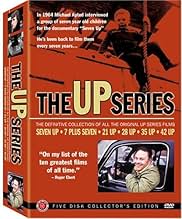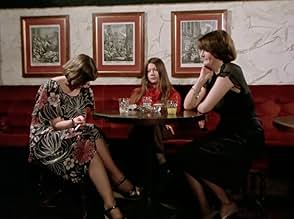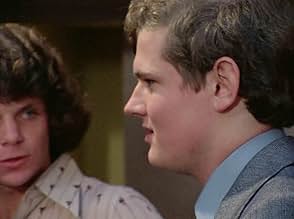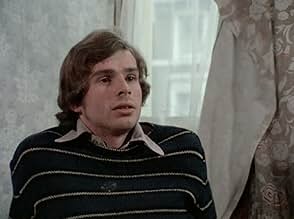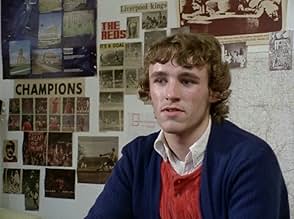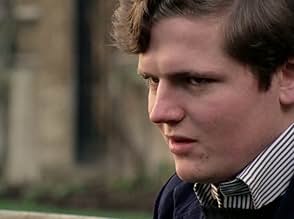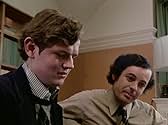Director Michael Apted interviews the same group of British-born adults after a seven-year wait as to the changes that have occurred in their lives during the last seven years.Director Michael Apted interviews the same group of British-born adults after a seven-year wait as to the changes that have occurred in their lives during the last seven years.Director Michael Apted interviews the same group of British-born adults after a seven-year wait as to the changes that have occurred in their lives during the last seven years.
- Awards
- 1 nomination total
- Self
- (as Bruce)
- Self
- (as Jackie)
- Self
- (as Simon)
- Self
- (as Andrew)
- Self
- (as John)
- Self
- (as Peter)
- Self
- (as Suzanne Lusk)
- Self
- (as Charles)
- Self
- (as Nick)
- Self
- (as Neil)
- Self
- (as Lynn)
- Self
- (as Paul)
- Self
- (as Susan Davis)
- Self
- (as Tony)
- Self - Narrator
- (voice)
- (uncredited)
Featured reviews
It starts off with the group watching themselves in the first two movies. Of course Apted starts with Nicholas, the scientist in the group. He pontificates and reflects on the past films. I wonder how much the films are affecting these kids. I wonder who dreads the upcoming interviews. I wonder if they try extra hard to look good in these films.
The most compelling are Neil and Suzy. Neil has drop out and working in menial jobs. He's dropping out of society. And Suzy is now fully into her role as the poor little rich girl. We find out that her parents separated soon after '7 Plus Seven'. These kids from the various walks of life is starting to gain colors. And not all the colors are pretty. But Michael Apted is digging deeper now and we're gaining more insights.
Each film gets longer, and this the third one is the longest yet. The production values are better and it no longer resembles a home movie so much. Now we get to see the same children at 7, 14, and 21. What a difference the 7 years made. From imagining what college they might go to and now seeing them in their final years of college, studying advanced subjects, grappling with what their professions will be. Or, in the case of some of the girls, already married with children. Still, we can identify characteristics that have stayed with each as they grew up.
We also see clearly for the first time how much the "process" has influenced the "product." In science the "uncertainty principle" tells us that the more closely you try to measure something the more your measurement technique changes what you are measuring. It is the same here. The participants are acutely aware of the process, and of their responses at 7 and 14, and they discuss them. To some degree who they are at 21 is a product of having been in the "UP" series.
This and all the others through '42-UP' in 1998 are on the 5-disk DVD set just out. ("49 UP" has been made but is not yet available on DVD.) However, simply seeing the most recent film (42-UP or 49-UP) is pretty good, because each film contains snippets of each of the former ones, allowing us to see how each child developed in 7-year increments.
Just a marvelous study of growing up.
Where we saw the kids in the first Up film become a little more shy and awkward in 7 Plus Seven, this time we see them a little more sure- or perhaps more sure about their uncertainty in life- and Apted focuses on subjects like marriage, careers, ethnic and racial tensions, politics, things covered in the previous segment but without so much emphasis on juxtaposition between clips (not that the flashbacks to previous films aren't useful). The insights are clear and always interesting, and we see how the same kids are still together in this film, or a little more varied (the three boys, for example, do not quite dress or look a like, one clean-cut and the other with long hair).
And, ultimately, we get a sense of what the Up series will evolve into: finding about who these people are by tracking what's happened over time and what they think could happen (or might not) in the future. And in 21 Up it's about coming of age, going through those teenage years into something else, or the same thing as they thought they would be at 7. It's never boring, and we want to see what will happen next or how their view has changed with the passing of time and history around them.
So my perspectives are quite different than the audience this was created for, at least through this third installment. England before the war was the most classbound society in Europe, which is to say the then modern world. They really came close to extinction during the war and in their own minds at least won because every citizen set aside every social convention and pulled together as a collective. A new notion of nationhood was hovering over the isle, one modelled after America, that former colony who bailed them out, funding them during the war effort at several times their national product.
After the war, the national will was to restore British society, but the question was to what? When this was made, there was extreme introspection as to what the nature of the British (I should say English) nation should be. No nation is as publicly introspective in their art as the English. So it is no surprise that we see this in British films, from here all the way to "The Queen," which I saw recently.
So. Pick 14 children. No immigrants. No non-whites, the residue of empire. Allow one child who we only learn in this edition, has a white, "purely English" mother, the father being completely out of the picture. Start with the premise that despite some modernization, England's rigid caste system is back as Strong as ever. Pick kids from different classes. Say over and over that their lives are determined by the age of seven.
Start.
I have no idea how far Aptet wanted to take this. It seems clear that he intended at least one followup to the interviews at seven. In this film, our subjects are 21. I expect Apted to develop more subtle richness in his perspective as he goes. After all, he will be growing and who has seven years to think about the next layer of pats work, each layer sort of reinventing the earlier ones? I do expect him to evolve, but he hasn't yet. He is still banging on one theme, that of class.
Our three lower class girls are obviously stuck, doomed. Our upper class girl is a mess; for all I know she will self-destruct but do it with creature comforts handy. Our three upper class boys are amazingly repellent in different ways and I suppose that is the point.
In between, we have a smattering of individuals, all challenged, all developing into fascinating stories that carry meaning far beyond that of any individual. I wonder why I like this so.
I think there are three reasons. One is that I watch a lit of movies, some with actors that with support can create reality. But even the best of these fades when confronted with real reality. These kids are tender, not professionals. Their stories are real. We only glimpse, and because we know how full each day in our own lives are, we fill in behind what we see: pains and joys, many, many disappointments. Loves.
This is helped immensely by a basic choice Apted has made. He's decided to give us real people with real lives that we know could only be narrated by giving us the entire seven years. Its an open world he is giving us. But he has stuck to closed world narrative conventions. The only parts of the story we learn about any of these people is 1) what we saw in previous installments, generously replayed and 2) what our heroes and heroines choose to tell us in their own words.
The power of constraining the narrative this way is immense, a terrific decision. Apted rarely (it seems never) tells us for instance that so and so had a drug problem, had two abortions and so on. If the people themselves don't tell us, we don't know. I am in awe of this decision and wonder how it will play in future installments. Surely he has tons of footage that he didn't use in the earlier films that would be insightful; but if it wasn't actually broadcast, it doesn't exist.
So part of the thrill here is in watching the filmmaker's shaping of the narrative, because of course he is asking the leading questions, weaving what we get from what happened.
But there's another soap opera at work here. I mentioned that I am an American, someone who finds notions of class quaint, puzzling, offensive, illogical. So while I watch what amounts to a soap opera of 14 lives, and I watch the way a strictly cinematic story is pulled out of them, I also watch the soap opera of an alien people try to preserve these social anomalies because their person story is tied to their national one. And this interstory story is close to what life is about.
Ted's Evaluation -- 3 of 3: Worth watching.
Did you know
- TriviaThe film is included on Roger Ebert's "Great Movies" list.
- Quotes
Andrew Brackfield: Education is very important and you can never be sure of leaving your children any worldly goods, but at least you can be sure that once you've given them a good education that's something that no one can ever take away.
- ConnectionsFeatured in 28 Up (1984)
Details
- Release date
- Country of origin
- Language
- Also known as
- Twenty One Up
- Production company
- See more company credits at IMDbPro
Contribute to this page


